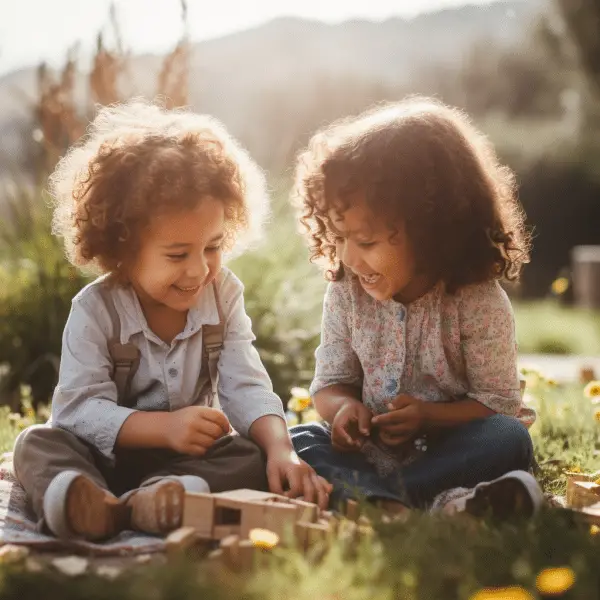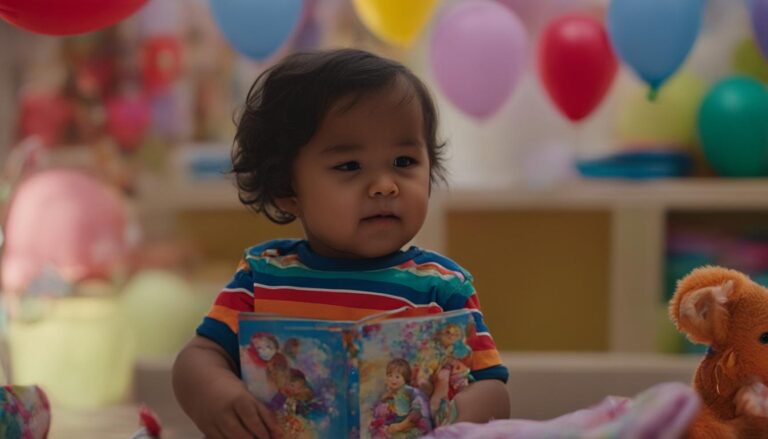Baby’s First Playdate: Navigating Social Interactions
Playdates are an important part of a baby’s social development. They provide opportunities for infant socialization, the formation of baby friendships, and the development of social skills. Navigating these early social interactions can help children build confidence, create friendships, and learn valuable social conventions.
Key Takeaways:
- Playdates are crucial for a baby’s social development.
- Parents can model how to be a friend and teach basic social conventions.
- Starting with one-on-one playdates can help children build confidence.
- Focusing on common interests and scheduling playdates in a structured manner is important.
- Playdates provide opportunities to reinforce positive behaviors and build social skills.
The Importance of Modeling Friendship
Modeling friendship is a crucial aspect of teaching children social skills and nurturing their guidance. By demonstrating how to be friendly and considerate in daily interactions, parents can show their children how to make friends. Engaging in conversations with others and encouraging their child to do the same can further reinforce these valuable lessons. For example, parents can talk to their child about the importance of getting someone’s attention, asking questions, and introducing themselves.
Through these simple steps, parents lay the foundation for their child’s future social interactions. By modeling friendship, parents help their children understand the importance of being a good friend and how to build meaningful connections. It is during early childhood that children develop essential social skills, and by providing nurturing guidance, parents can help shape their child’s behavior and attitudes towards others.
“Friendship is born at that moment when one person says to another, ‘What! You too? I thought I was the only one.'” – C.S. Lewis
By modeling friendship, parents can also instill values such as empathy, kindness, and inclusivity. Children learn by observing, and when they see their parents treating others with respect and compassion, they are more likely to emulate those behaviors. Modeling friendship is not only about teaching children how to make friends; it’s also about fostering a sense of community and creating a positive social environment for all.
Teaching Social Skills through Modeling Friendship
Modeling friendship provides children with a tangible example of how to navigate social interactions and build relationships. By observing their parents’ behavior and following their lead, children learn valuable social skills, such as active listening, sharing, and resolving conflicts peacefully. These skills set the stage for successful future interactions and help children develop into socially adept individuals.
Step-by-Step Guide to Scheduling Playdates
Scheduling playdates is an important aspect of fostering your child’s social development. By following a step-by-step approach, you can create a structured and enjoyable playdate experience for your child. Here is a guide to help you navigate the process:
Starting with One Child
When scheduling playdates, it’s recommended to start with one child at first. This approach allows your child to focus on building a connection with one friend, which can be less overwhelming for both children. It provides an opportunity for your child to gain confidence in socializing and learn important social skills.
Gaining Independence
As your child becomes more comfortable with playdates, you can gradually increase their independence. Encourage them to take the lead in planning activities and conversations during playdates. This helps them develop their social skills and build friendships based on shared interests and commonalities.
Considerations for Scheduling
When scheduling playdates, it’s important to consider shared interests and preferences. Look for children who have similar hobbies or enjoy similar activities. This can help facilitate conversation and create a positive and engaging playdate experience. Playdates can take place in various settings such as sports practices, classes, or clubs, providing a natural and comfortable environment for interaction.
By following these steps and considerations, you can ensure that playdates are a valuable and enriching experience for your child, promoting their social development and helping them build lasting friendships.
| Step | Action |
|---|---|
| Step 1 | Start with one child |
| Step 2 | Gradually increase independence |
| Step 3 | Consider shared interests in scheduling |
Structured Playdates for Success
When planning a playdate for your child, incorporating structure can help ensure that the experience is enjoyable and beneficial for everyone involved. Structured playdates provide a solid framework for interaction and help children develop social skills. Here are some strategies to make your playdates a success:
1. Ice Breakers
Ice breakers are a great way to kick off a playdate and encourage interaction between children. It can be as simple as providing an activity like play dough or puzzles that require teamwork and collaboration. These activities help children get comfortable with each other and create opportunities for conversation and engagement.
2. Setting Ground Rules
Establishing clear ground rules is essential for managing behavior and setting expectations during playdates. Communicate these rules to both your child and the other child’s parent ahead of time. Ground rules can include sharing toys, taking turns, using kind words, and respecting personal space. By setting clear boundaries, you create a safe and positive environment for everyone.
During the playdate, be prepared to intervene if needed and redirect behavior that goes off course. It’s important to address any conflicts or challenges that arise promptly and calmly.
3. Providing Alternative Activities
Not all children may be interested in the same activities during a playdate. Be prepared with alternative options to redirect attention and promote positive interactions. Having a variety of activities available ensures that all children can find something they enjoy and engage with others in a meaningful way.
| Structured Playdate Tips | Benefits |
|---|---|
| Plan ice breaker activities | Encourages interaction and teamwork |
| Set clear ground rules | Manages behavior and establishes expectations |
| Offer alternative activities | Promotes inclusivity and caters to diverse interests |
By incorporating these strategies into your playdates, you can create a structured environment that supports social development and positive interactions. Remember, playdates are not only an opportunity for children to play but also a chance for them to learn valuable skills that will benefit them throughout their lives.
Using Playdates to Build Social Skills
Playdates provide a valuable opportunity for children to develop and refine their social skills. As parents, it’s important for us to observe our child’s behavior during playdates and identify areas where they excel and areas where they may need some guidance. By observing their interactions with other children, we can gain insight into their social strengths and weaknesses, allowing us to offer gentle comments to reinforce positive behaviors and help them learn how to be a good friend.
During playdates, it’s crucial to create a supportive and nurturing environment where children can learn and grow. By modeling respectful communication, gracious manners, and inclusive behaviors, parents can help shape the way their child interacts with others. Offering gentle comments like “That was kind of you to share your toy” or “Great job taking turns” can go a long way in reinforcing positive social skills and encouraging their development.
Additionally, addressing challenges that arise during playdates can be a valuable teaching moment. If a child struggles with sharing, for example, parents can step in and provide guidance on how to take turns or explain the importance of sharing with their friends. By addressing these challenges in a gentle and supportive manner, parents can help their children learn new behaviors and grow socially.
Important Skills to Observe During Playdates
- Sharing and taking turns
- Active listening and responding
- Cooperating and collaborating
- Problem-solving and conflict resolution
- Empathy and understanding
By actively observing our children’s behavior during playdates and providing guidance when needed, we can help them build essential social skills and lay a strong foundation for future friendships. Playdates offer a safe and supportive environment for children to practice these skills, and as parents, we have the opportunity to nurture and foster their growth every step of the way.
| Benefits of Playdates for Social Skills Development | Key Takeaways |
|---|---|
| Opportunity to observe and assess social strengths and weaknesses | Parents can offer gentle comments to reinforce positive behaviors |
| Modeling respectful communication and inclusive behaviors | Addressing social challenges in a supportive manner |
| Practice sharing, taking turns, cooperating, and problem-solving | Nurturing empathy and understanding |
Playdates for New Parents: Common Questions and Answers
As a new parent, playdates can raise many questions and uncertainties. It’s natural to wonder what to expect and how to navigate different situations. Here are some common questions and answers to help you manage your expectations and make plans for successful playdates with your little one.
What can I expect from playdates prior to preschool?
Playdates before preschool age are often more for parents to connect with other adults while children engage in parallel play. It’s a great opportunity to socialize with other parents and share experiences. During these playdates, parents usually stay with their child unless explicitly told it is a drop-off date. This allows you to closely supervise and support your child’s interactions while building your own network of parent friends.
How should I plan playdates for older children?
As your child grows, playdates may involve more solo play and can be planned around their naptime or other daily routines. It’s important to discuss snack preferences and any allergies with other parents to ensure a safe and enjoyable playdate. Communication is key to coordinating schedules and activities, so be sure to keep an open line of communication with other parents to avoid any confusion or misunderstandings.
What should I bring to a playdate?
When attending a playdate, it’s always a good idea to bring some snacks or drinks for your child. Additionally, you may want to pack some of your child’s favorite toys or activities to keep them engaged during the playdate. It’s also helpful to have some extra diapers, wipes, and a change of clothes, just in case. And don’t forget to bring your positive attitude and a friendly smile!
How can I manage my expectations for playdates?
Every child is different, and each playdate may have its own unique dynamics. It’s important to remember that not every playdate will be perfect or go exactly as planned. Some children may be more outgoing and sociable, while others may be shy or take longer to warm up to new people. Be patient and understanding, and remember that playdates are ultimately about having fun and building relationships.
By understanding what to expect, having open communication with other parents, and maintaining a positive attitude, you can navigate playdates with confidence and create memorable experiences for both you and your child.
Playdates as Children Grow: Strategies for Success
As children grow, their playdates may undergo various changes and require different strategies for success. One key aspect to consider is parental involvement. Depending on the child’s age and comfort level, parents may need to adjust their level of participation. Some children may prefer more independence during playdates, while others may still require parental supervision. This can be discussed and agreed upon with other parents to ensure everyone’s needs are met.
Establishing time frames for playdates is another important consideration. As children get older, their attention spans may increase, and they may be able to engage in longer playdates. This could include activities like sleepovers, where children have more time to bond and build deeper friendships. Clear communication among parents is crucial to establish the duration and expectations for these extended playdates.
It’s also important to note that as children grow, their interests and preferences may change. This can impact the choice of activities during playdates. Parents can encourage their children to explore new hobbies, sports, or other interests by organizing playdates based on shared activities. This not only fosters friendships but also allows children to develop their individual skills and passions.
The Benefits of Playdates as Children Grow
“Playdates continue to play a vital role in a child’s social development as they grow. It provides them with opportunities to practice communication, problem-solving, and cooperation skills. Playdates also foster independence and teach children how to navigate different social situations. By adjusting our involvement and understanding their changing needs, we can support their growth and help them build meaningful friendships.”
| Parental Involvement | Establishing Time Frames | Choice of Activities | |
|---|---|---|---|
| Benefits | Supports child’s comfort level | Allows for longer playdates | Fosters exploration of new interests |
| Considerations | Communication with other parents | Agreeing on duration and expectations | Considering child’s changing interests |
By adapting our approach to playdates as children grow, we can continue to provide them with valuable social experiences. Parental involvement, establishing appropriate time frames, and considering their evolving interests all contribute to successful playdates. As parents, it’s important to stay attuned to our children’s needs and collaborate with other parents to create enriching playdate experiences.
Playdates for Middle School and High School Kids
As children grow into their middle school and high school years, playdates begin to take on a new form. These “hangouts” offer older kids a greater sense of independence and freedom to socialize with their peers. Playdates for older kids provide opportunities for them to practice communication skills, develop their own social networks, and establish their own identities.
During these playdates, parents often take a step back and allow their children to navigate social interactions on their own. While parental involvement may be less hands-on, it’s crucial for parents to maintain open lines of communication with other parents to ensure safety and coordinate logistics. Cellphones can be a helpful tool for communication and check-ins, enabling parents to stay connected while giving their children a sense of independence.
When it comes to playdates for older kids, snack and meal choices can be left to their discretion, allowing them to exercise their independence and make decisions for themselves. However, it’s important for parents to be aware of any allergies or dietary restrictions to ensure a safe and inclusive environment for all participants.
The Benefits of Playdates for Middle School and High School Kids
Playdates for older children not only foster independence and allow for socialization, but they also provide valuable opportunities for personal growth. These playdates help teenagers build important life skills such as communication, problem-solving, and decision-making. They learn to navigate social dynamics, negotiate conflicts, and establish boundaries – all essential skills for their future relationships and interactions.
Furthermore, playdates for older kids promote a sense of belonging and help them establish their own social networks outside of school. These connections can contribute to their overall well-being, providing a support system and a sense of community during the often challenging adolescent years.
| Benefits of Playdates for Middle School and High School Kids | Benefits |
|---|---|
| Develops independence | Allows children to socialize without direct parental supervision |
| Builds communication skills | Provides opportunities for teenagers to practice interpersonal interactions |
| Promotes personal growth | Helps teenagers develop important life skills |
| Fosters a sense of belonging | Creates social connections and a support system outside of school |
Overall, playdates for middle school and high school kids offer a valuable opportunity for growth, independence, and the development of essential social skills. Parents can support their children’s playdates by maintaining open lines of communication with other parents, providing guidance when needed, and fostering a safe and inclusive environment that allows for personal exploration and development.

Conclusion
In conclusion, baby’s first playdates are crucial for successful social interactions and fostering friendships. As parents, we play a pivotal role in modeling friendship and teaching our children important social skills. By starting with one-on-one playdates and focusing on common interests, we can help our babies build confidence and create meaningful connections.
Structured playdates provide a positive environment for children to engage and learn. By planning activities, setting ground rules, and redirecting behavior when necessary, we can ensure that playdates run smoothly and promote positive interactions. Through observation and offering gentle comments, we can guide our children in developing essential social skills and being good friends.
As our children grow older, playdates will evolve, allowing them more independence and freedom. Whether it’s scheduling playdates for middle school and high school kids or navigating playdates as children grow, clear communication and parental involvement remain important. By fostering open lines of communication and ensuring safety, we can support our children in building lasting friendships.
In summary, by approaching baby’s first playdates with patience, flexibility, and a focus on fostering friendships, we set the stage for enjoyable social interactions and the development of vital social skills. These early experiences lay the foundation for our children’s future relationships and contribute to their overall well-being.
FAQ
Why are playdates important for a baby’s social development?
Playdates provide opportunities for babies to interact with their peers and learn valuable social skills.
How can parents model friendship for their children?
Parents can demonstrate friendly and considerate behavior in their daily interactions and engage in conversations with others.
How should playdates be scheduled?
Playdates should be based on shared interests and commonalities, and parents should start with one child to avoid overwhelming everyone involved.
How can parents ensure that playdates run smoothly?
Structured playdates with planned activities and ground rules can help manage behavior and expectations.
How can playdates be used to build social skills?
Parents can observe their child’s behavior, offer gentle comments to reinforce positive behaviors, and help address challenges that arise during playdates.
What are some common questions new parents have about playdates?
New parents often wonder about the purpose of playdates, whether they should stay with their child, and how to handle snack preferences and allergies.
How do playdates evolve as children grow?
Playdates can become more independent, with varying levels of parental involvement depending on the child’s age and comfort level.
How are playdates different for middle school and high school kids?
Playdates for older kids involve more independent planning and communication, and parents may have less involvement in organizing and supervising.
How do playdates contribute to a baby’s social development?
Successful playdates help babies develop social skills, foster friendships, and lay the foundation for future social interactions.







